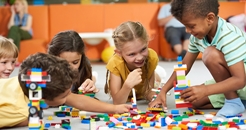 Learning through play: more than laughter and smiles
Learning through play: more than laughter and smiles
From a blog by Child and Family
Recent research by the PALS group (Play and Learning Scholars Around the World) asked mothers in five countries (Argentina, Denmark, Hong Kong, the United Kingdom, and the United States) about the feelings they associate with play. Pleasant emotions dominated their responses. For example, a US mother said, “When you’re playing, why wouldn’t you be happy cause you’re having fun, you’re doing an activity, you’re using your imagination, you’re engaged.” A mother from Hong Kong acknowledged that play offers children first-hand experiences that “actually can’t be learned from a book … [such as] how to communicate with other people, how to read people’s facial expressions or how to read how they are feeling, expressing your own feelings.”
The researchers also asked five- and seven-year-old children to describe what play meant to them. Perhaps surprisingly, children mentioned more than just joyful emotions. With their words, gestures and actions, they spoke of having fun, but also trying hard, thinking, and needing to be focused. As one seven-year-old boy from Argentina said, in play “you enter a fantasy world, and it is really fun and you concentrate.” Children spoke of play as a way of diving into a world that only they inhabit. They also reported that they became cross or frustrated when they had to wait their turn, did not win, or found that an activity was too difficult for them. A five-year-old girl from the UK described feeling cross if someone else popped the bubbles she was making. Others explained that they felt confused, nervous or even a bit scared when playing games they didn’t quite understand. They also expressed loneliness, as when they yearned for a companion but had to play alone. Wider research evidence suggests that during shared pretend play, the variety of emotions children can explore expands as they watch their playmates respond with laughter, tears, or impatience.
As adults, we might sometimes think that children are ‘only’ playing. But play offers many opportunities for children to grow emotionally and cognitively. Thus play works as an emotional toolbox—a safe space in which many emotions can be experienced without consequences or worrying about whether the emotion is acceptable to the big people in children’s lives.
Pretend play is a great way to help children express their emotions without having to claim the feelings as their own. Parents and siblings can join in and create imaginative scenarios and play worlds. Pretend play also helps children cope with intense emotions from their unsettling circumstances. For example, a mother from Denmark described observing children “where they played that somebody died, or that they had to go to the hospital or things that they hear in society, they take that into play.” This kind of play affords children the opportunity to work through their fears and to return to a safe place.
When children are playing, they are also practising how to communicate and handle their emotions in socially acceptable ways (for example, it is unacceptable to lash out physically in anger). Working through these emotions in play helps build socioemotional skills such as self-regulation, empathy, and perspective-taking. Play teaches children that emotions come and go. Play lets children practise managing difficult situations and gives them confidence to resolve such situation in the future. Similarly, concentrating during play can help children increase their attention span, which can translate to improved attention in school, at home, during sports, and during art projects.
As Lev Vygotsky, the famous Russian child theorist wrote, “In play, children are a head taller than themselves”—meaning that when they play imaginatively, children assume more mature perspectives than they do in real life, for example, playing a teacher, a shop assistant, a powerful wizard, or a superhero.
As adults, we might sometimes think that children are ‘only’ playing. But play offers many opportunities for children to grow emotionally and cognitively. When children ask someone to take turns or stop particular negative behaviours, they build their negotiation skills, and they learn how to advocate for themselves or others in response to what they see as unjust.
Taking the time to observe children at play can help adults understand children’s fears, concerns, and interests. Parents can join in the play in a number of ways, such as asking what children are doing and how they are feeling. Letting children play while experiencing the full toolbox of emotions will help them feel better in the here and now and prepare them for many future situations where emotion plays a role, including school.
Read full article here.
Retweet about this article:
From a blog by Child and Family, 12/08/2020